|
|
|
Sort Order |
|
|
|
Items / Page
|
|
|
|
|
|
|
| Srl | Item |
| 1 |
ID:
095301
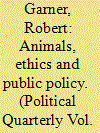

|
|
|
|
|
| Publication |
2010.
|
| Summary/Abstract |
In orthodox moral thinking in the West, animals count for something but human interests take precedence. It is argued that this moral orthodoxy or animal welfare position is flawed. It fails to take into account that some animals, like humans, are persons and that some, so-called 'marginal' humans lack personhood. More importantly, although it is likely that animals do not have an interest in liberty for its own sake and have less of an interest in continued life than humans, there is little justification for the animal welfare claim that an animal's suffering should be regarded as less important morally than that of a human. It is concluded that the adoption of a 'sentiency position', whereby animals have a right not to suffer, has radical implications for the way animals are treated, ruling out intensive forms of animal agriculture and those scientific procedures that inflict suffering as morally illegitimate.
|
|
|
|
|
|
|
|
|
|
|
|
|
|
|
|
| 2 |
ID:
114762


|
|
|
|
|
| Publication |
2012.
|
| Summary/Abstract |
In this article, the authors will consider a very narrow yet spectacularly important aspect of the rule of law: its place in a constitution-the constitution of the United Kingdom-in which supremacy rests not with the constitution as a document to be interpreted by a constitutional court, but with the legislature itself. While traditionally the supremacy of the Crown in Parliament has meant that British courts have had no right to set aside even the most oppressive legislation, recent extra-judicial writings and obiter dicta in case law have been indicative of a shift in the judicial mood. In light of these developments, the paper will ask: Where does the relationship between the supremacy of the Crown in Parliament and the rule of law stand now? Where might that trajectory take us? And what might be done to reconcile the two?
|
|
|
|
|
|
|
|
|
|
|
|
|
|
|
|
| 3 |
ID:
171000
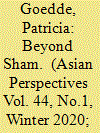

|
|
|
|
|
| Summary/Abstract |
The Constitution of the Democratic People's Republic of Korea is often dismissed as a valid legal instrument within the larger framework of the North Korean legal system. This is an unsurprising outcome given the portrayal of North Korea as a totalitarian dictatorship, documented human rights abuses, and the lack of access to the country's lawmaking processes. It is also a foreseeable result if comparisons are made to liberal democratic constitutions where rights guarantees and judicial review are defining elements. However, the North Korean Constitution deserves more nuanced scrutiny in light of evolving research on socialist and authoritarian constitutionalism in Asia. This article argues that the DPRK Constitution should be included more substantively within the analytical frameworks of Asian, socialist, and authoritarian constitutionalism by virtue of how it functions to nation-build, legitimate institutional leadership, signal ideological shifts, regulate society on collectivist, duty-based principles, and guide economic reforms for development and modernization.
|
|
|
|
|
|
|
|
|
|
|
|
|
|
|
|
| 4 |
ID:
113786
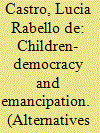

|
|
|
|
|
| Publication |
2012.
|
| Summary/Abstract |
Modern conceptions of politics are intrinsically related to theories of subjectivity shaped by a teleological narrative expressing claims about instrumental rationality, moral and psychological autonomy, and individualized selfhood. Consequently, children have been considered to be lacking both the credentials necessary to act and participate in politics and the subjective dispositions of proper political subjects. This overwhelming conception of subjectivity as a purposefully and rationally oriented individual produced by a sovereign politics may be contested. Empirical data deriving from recent research on children's and youth's participation in schools are presented to show how children and youth effectively manage "to speak" and build a different point of view from those of adults about their school experience. Such research provokes analysis of insidious but unpublicized forms of domination and resistance. The inclusion of children in politics seems to depend on our capacity to overcome taken-for-granted truths about adult-centered society.
|
|
|
|
|
|
|
|
|
|
|
|
|
|
|
|
| 5 |
ID:
139461
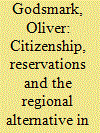

|
|
|
|
|
| Summary/Abstract |
This paper unearths an alternative paradigm through which to consider the discussions and debates between members of the Indian public, government bureaucrats and Congress Party politicians about the rights and interests of Indian citizens both before and immediately after India's Independence in 1947. It argues that much of the recent historical work on citizenship during this period has been preoccupied with issues of nationality and religious community as a result of the fallout from Partition. However, the demands and deliberations over the introduction of provincial forms of affirmative action in the all-India services at this time are indicative of a different narrative. First, many provincial representations of ‘minority’ rights often took into account differences of caste and language instead. Second, and perhaps more importantly, the term minority was employed not only to describe demographic minority status, but also to define under-represented groups in the all-India services. In doing so, these different provincial policies prioritised particular local rights to representation, in which citizenship was expressed through a regional idiom.
|
|
|
|
|
|
|
|
|
|
|
|
|
|
|
|
| 6 |
ID:
187073


|
|
|
|
|
| Summary/Abstract |
Addressing research on migration governance, this article examines German pre-integration courses offered to Turkish marriage migrants in Istanbul. The courses were implemented in response to growing concern about the perceived poor integration of Muslim migrants and a high number of forced marriages. I argue that these courses are a micro form of biopolitical governance. Specifically, they are an attempt to generate internalized ways of being and knowing that are desired by the state, which I call ‘membership cultivation.’ As such, the courses are not precisely aimed at restricting migration as in other pre-integration measures, nor are they mainly reinforcing symbolic boundaries and teaching liberalism as in post-migration German civic integration courses. Rather, the courses attempt to re-make migrants with regards to morality, culture and gender. Using participant observation and in-depth interviews, this research examines the disciplinary mechanisms targeting migrants’ transformation to enhance our understanding of the biopolitics of pre-integration governance.
|
|
|
|
|
|
|
|
|
|
|
|
|
|
|
|
| 7 |
ID:
082035
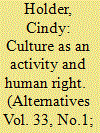

|
|
|
|
|
| Publication |
2008.
|
| Summary/Abstract |
Historically, culture has been treated as an object in international
documents. One consequence of this is that cultural
rights in international law have been understood as rights of
access and consumption. Recently, an alternative conception
of culture, and of what cultural rights protect, has emerged
from international documents treating indigenous peoples.
Within these documents culture is treated as an activity rather
than a good. This activity is ascribed to peoples as well as persons,
and protecting the capacity of both peoples and persons
to engage in culture is taken to be as basic a component of human
dignity as are freedom of movement, freedom of speech,
and freedom from torture.
It is not an accident that this treatment of culture has
emerged from international documents treating indigenous
peoples, for indigenous peoples' cultural rights can be fully
understood only against the background of their basic rights
to self-determination. However, the value of this treatment of
culture extends beyond the human rights of indigenous peoples.
Treating culture as an activity establishes an understanding
of what cultural rights protect that clarifies the relationship
between cultural rights and other mechanisms for protecting
minorities and frames the role of cultural communities in the
realization of human dignity as an important physical and political
issue, not just a psychological one. This article offers an
account of what is wrong with violating cultural rights that
clearly and straightforwardly links violations of a group's cultural
rights to violations of its rights to persist and to flourish. For
these reasons, the norms regarding cultural rights that are
emerging from international documents treating indigenous
peoples are a much-needed step forward for peoples' rights
more generally
|
|
|
|
|
|
|
|
|
|
|
|
|
|
|
|
| 8 |
ID:
085002
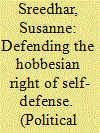

|
|
|
|
|
| Publication |
2008.
|
| Summary/Abstract |
A well-known part of Hobbes's political theory is his discussion of the inalienability of the right of self-defense. In this article, I present and defend a reinterpretation of Hobbes's account of self-defense. I begin by showing the weaknesses of the standard interpretation of this account: It rests on an implausible thesis about the evil of death; it renders Hobbes's applications of the right of self-defense inexplicable; and it conflicts with Hobbes's claim that there are cases in which the right of self-defense can be given up. I argue that we should understand Hobbes's claim to be that the right of self-defense is inalienable only in the social contract, and I offer a new interpretation of how his argument on this point might go.
|
|
|
|
|
|
|
|
|
|
|
|
|
|
|
|
| 9 |
ID:
085337
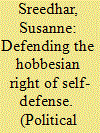

|
|
|
|
|
| Publication |
2008.
|
| Summary/Abstract |
A well-known part of Hobbes's political theory is his discussion of the inalienability of the right of self-defense. In this article, I present and defend a reinterpretation of Hobbes's account of self-defense. I begin by showing the weaknesses of the standard interpretation of this account: It rests on an implausible thesis about the evil of death; it renders Hobbes's applications of the right of self-defense inexplicable; and it conflicts with Hobbes's claim that there are cases in which the right of self-defense can be given up. I argue that we should understand Hobbes's claim to be that the right of self-defense is inalienable only in the social contract, and I offer a new interpretation of how his argument on this point might go.
|
|
|
|
|
|
|
|
|
|
|
|
|
|
|
|
| 10 |
ID:
180076
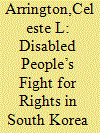

|
|
|
|
|
| Summary/Abstract |
Long considered objects of pity and welfare assistance, people with disabilities in South Korea and Japan are increasingly treated as rights-bearers. Through activism, litigation, and involvement in international treaty negotiations, Koreans and Japanese with disabilities spurred reforms that created new anti-discrimination protections and obligations to provide reasonable accommodations, access, employment, and social supports. These policy changes also signal a notably more legalistic approach to governance, particularly in South Korea, because they include more detailed rules and formal rights, more enforcement mechanisms like fines, and better recourse to judicial or other dispute resolution bodies.
|
|
|
|
|
|
|
|
|
|
|
|
|
|
|
|
| 11 |
ID:
128529
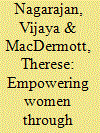

|
|
|
|
|
| Publication |
2013.
|
| Summary/Abstract |
Although the pluralist system of land tenure in Vanuatu does not directly discriminate against women, the operation of the system and contemporary interpretations of custom is increasingly marginalising women from the decision making processes regarding land management and control. Commitment to the principles of gender equality through constitutional guarantees and the ratification of relevant international treaty obligations, while providing a relevant legal framework for equality, have only had limited success in addressing discriminatory practices. This article analyses alternative ways to overcome the barriers faced by women that are currently under consideration in many Pacific island Countries, including recording and registration, as well as legal vehicles such as incorporating customary land groups, trusts and community companies. This article concludes that while both existing and proposed mechanisms have the potential to secure for women a greater role in decision making processes regarding land management and control, that potential will not be realised in the absence of knowledge, empowerment and the acceptance of the legitimacy of such rights
|
|
|
|
|
|
|
|
|
|
|
|
|
|
|
|
| 12 |
ID:
178025
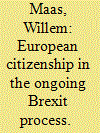

|
|
|
|
|
| Summary/Abstract |
Although traumatic, the ongoing Brexit process does not fundamentally alter either the legal status of European citizenship or the debates about it within the European Union (EU). Citizenship and free movement are so fundamental to the European project that even the new status of an important state like the UK does not change the political dynamics surrounding them.
|
|
|
|
|
|
|
|
|
|
|
|
|
|
|
|
| 13 |
ID:
132385
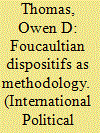

|
|
|
|
|
| Publication |
2014.
|
| Summary/Abstract |
This paper examines the Indian government's Unique Identification (UID) program, the largest digital biometric program in history. UID is intended to provide a new model of security based on a complex interrelation between welfare, identity and rights. The program resembles the kind of liberal governmentality and biopolitical imperative described by Foucault, yet it is also inseparable from the specific socio-historic conditions in India that constitute the strategic need for UID. This paper contributes to an ongoing debate as to the suitability of Foucault's thought for international studies by suggesting a productive line of inquiry: tracing the variance between the rationality of government programs and the technologies of enactment. The paper utilizes three methodological "prescriptives" from Foucault's concept of the dispositif, which are applied to the case study. This paper argues that the concrete application of the program challenges the perception that biometric technologies can guarantee the identity and inclusion of the political subject when applied across different geographies with different socio-historical conditions. The specific discursive and non-discursive conditions present in the application of UID lead to unexpected political strategies. While India's UID program seeks to augment the population with the biometric identity necessary for consumer citizenship, frugal government and expanded surveillance, those whose bodies are not "readable" by the biometric technology are excluded. It is exactly those subjects that the program aims to help that are most likely to be excluded.
|
|
|
|
|
|
|
|
|
|
|
|
|
|
|
|
| 14 |
ID:
181337
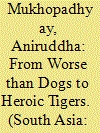

|
|
|
|
|
| Summary/Abstract |
Dalit autobiographies narrate the journey of protagonists from the ‘untouchable’ communities of India towards self-realisation and their struggle for human rights. A vigilant reading recognises the representation of animals as tropes in Dalit autobiographies that trace the reconstitution of the non-human limit of the Dalit as narrative subject. This paper reads Dalit autobiographies by Narendra Jadhav, Bama and Namdeo Nimgade to reveal the importance of animals as an analogy in Dalit literature, but then, following the work of Spivak and Derrida, it deconstructs the circulation of the hegemonic logic of the rational humanist subject in the radical gesture of Dalit subject constitution.
|
|
|
|
|
|
|
|
|
|
|
|
|
|
|
|
| 15 |
ID:
085985
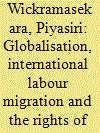

|
|
|
|
|
| Publication |
2008.
|
| Summary/Abstract |
The aim of the paper is to highlight the gaps between policy and practice in the current discourse on international migration and its links with development. It contends that a major cause of the limited development impact of migration is the 'closed door policy' of major destination countries on the admission of low-skilled migrant workers from developing countries. The paper addresses the weak foundations and major consequences of this policy: the denial of labour demand, channelling a large part of flows to irregular migration, consequent exploitation and violation of rights of migrant workers, and accelerated brain drain from developing countries. While there is increasing emphasis on temporary migration policies and programmes for low skilled labour, achievements on the ground have been quite limited. The movement towards a global migration regime which can address current pressing issues has also not progressed beyond broad consultative forums. There is an imperative need for fresh approaches and bold initiatives to promote international labour mobility for the welfare of the global community.
|
|
|
|
|
|
|
|
|
|
|
|
|
|
|
|
| 16 |
ID:
149173
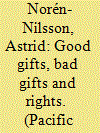

|
|
|
|
|
| Summary/Abstract |
In the Cambodian national elections in 2013, the opposition Cambodia National Rescue Party (CNRP) experienced a strong surge in support, finishing a close second to the long-incumbent Cambodian People’s Party (CPP). Whilst the CNRP campaigned on an anti-money politics, rights-based agenda, the CPP has relied on gift-giving practices to maintain links with voters. This article explores changing popular conceptions of issue_images_89_4_nilsson_cambodia-election-perceptions-ea-image02-jpgprovision to assess to what extent a democratic, rights-based conscience in Cambodia has emerged under the current neo-patrimonial regime. Building on qualitative interviews with 192 voters in post-election Cambodia, it finds that gift-giving practices play a different role than current academic theorizations of popular politics, and Cambodian popular politics in particular, would lead us to expect. Ordinary Cambodians are found to make a distinction between contingent and non-contingent exchanges in electoral mobilization, rejecting the former and embracing the latter. CPP gift giving in its current guise is consequently devoid of popular legitimacy across the political camps. At the same time, the idea of meritorious gift giving lives on as an ideal, especially among CNRP supporters.
|
|
|
|
|
|
|
|
|
|
|
|
|
|
|
|
| 17 |
ID:
099617
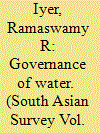

|
|
|
|
|
| Publication |
2010.
|
| Summary/Abstract |
The term 'water governance' encompasses a wide range of issues of water policy, management, sharing, rights, conflicts, social justice and equity, conservation, sustainability and so on; and almost all of them involve legal questions. This article provides a broad overview, both explanatory and prescriptive, of some of the legal issues relating to water. These will include the question of ownership of water; the relationship between the state and civil society; the doctrine of public trust; the distinction between the right to water (that is, water as life-support) and water rights (use rights such as for agriculture, industry, etc.); water-related disputes of all kinds (including river water disputes) and the principles, entitlements, relative priorities and institutional arrangements needed for avoiding or resolving them; water markets and the question of privatisation of water; the regulation of water use in the interest of equity, social justice, harmony and sustainability and so on.
|
|
|
|
|
|
|
|
|
|
|
|
|
|
|
|
| 18 |
ID:
136257
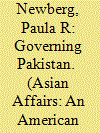

|
|
|
|
|
| Summary/Abstract |
Almost seven decades of contentious civil-military relationships in Pakistan have subsumed domestic and foreign policies under the umbrella of a rigid state. The six books reviewed here examine the causes and consequences of this inelasticity and, both directly and indirectly, argue for new understandings of Pakistan's politics.
|
|
|
|
|
|
|
|
|
|
|
|
|
|
|
|
| 19 |
ID:
178248


|
|
|
|
|
| Summary/Abstract |
Leading feminist scholars and activists have critiqued the current impact of South Africa’s provisions for gender equality and sexual rights. The country boasts one of the most progressive constitutions in the world, and its formal mechanisms for gender transformation and sexual citizenship are – at a global level – pathbreaking. At the same time, however, violence against women, gender non-conforming people and gays and lesbians or ongoing gender-based injustices in workplaces, educational institutions and many homes testify to the fact that such measures have not transformed ideological beliefs, institutional cultures and power relations in many public and domestic contexts. This article confronts the disjuncture between the formal provision of rights and actual practice, by analysing the effects of provisions devoid of transformative impact. It is argued that the country’s seemingly democratic arrangements for gender justice and sexual citizenship reproduce new forms of governmentality, biopolitics and biopower. By drawing on the work of Jasbir Puar, the article argues that South Africa’s imagining as a democratic state is based largely on its provision of rights around sexuality and gender, and in relation to peripheries that are ‘measured’ by the absence of these. In the global imagining, gender equality and sexual citizenship currently serve as tropes for definitive freedoms and democracy. The recognition of gender equality and sexual citizenship ratifies a particular international understanding of ‘democracy’, one that is congruent with global neoliberal standards, and that actively reproduces the gendered, heteronormative, classist and racist status quo.
|
|
|
|
|
|
|
|
|
|
|
|
|
|
|
|
| 20 |
ID:
171633
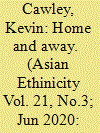

|
|
|
|
|
| Summary/Abstract |
South Korea is an evolving country that encourages immigration, and which presents itself as a multicultural country. Nevertheless, multiculturalism has not gone as smoothly as the government would like us to believe, and discrimination and racism are serious issues, especially due to Korea’s self-imposed ideology of Korean purity and homogeneity. This complicates Koreans’ sense of identity, both at home and abroad, issues dealt with in this special issue, which features three articles that deal with the complexities of ethnicity and identity in the twenty-first century. These articles look at the transformative notions surrounding Korean identity in Korea, and how the lingering legacy of colonial history negatively frames this identity in Japan. Finally, there is an examination of Korean immigrant entrepreneurship in Argentina, looking at the Korean community there in a very different socio-historical reality, where people negotiate their identities beyond the structures of Japan’s colonial legacy.
|
|
|
|
|
|
|
|
|
|
|
|
|
|
|
|
|
|
|
|
|